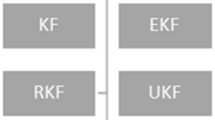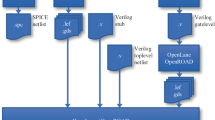Abstract
Adaptive filters based on least-mean-square (LMS) algorithm are used in several applications in virtue of their good steady-state performance, numerical stability, and acceptable computational complexity. The hardware implementation of LMS filters requires a massive number of multipliers that significantly impact on the power consumption. Approximate computing, a design technique that trades off computation accuracy for better electrical performance, is a way to improve the energy efficiency of LMS filters. In this paper, we implement state-of-the-art approximate multipliers and evaluate their impact on the performance of the LMS algorithm. Moreover, a novel approximate multiplier, whose accuracy can be tuned at design time to better adapt to the application scenario, is proposed. Implementation results in 28-nm CMOS technology allow us to investigate the power versus quality trade-off of the considered LMS approximate filters in two different applications.







Similar content being viewed by others
References
M. Alioto, Enabling the Internet of Things: From Integrated Circuits to Integrated Systems (Springer, Berlin, 2017)
D.J. Allred, Y. Heejong, V. Krishnan, W. Huang, D.V. Anderson, LMS adaptive filters using distributed arithmetic for high throughput. IEEE Trans. Circuits Syst. I Regul. Pap. 52, 1327–1337 (2005). https://doi.org/10.1109/TCSI.2005.851731
J.C.M. Bermudez, N.J. Bershad, A nonlinear analytical model for the quantized LMS algorithm-the arbitrary step size case. IEEE Trans. Signal Process. 44, 1175–1183 (1996). https://doi.org/10.1109/78.502330
V.K. Chippa, S.Y. Chakradhar, K. Roy, A. Raghunathan, Analysis and characterization of inherent application resilience for approximate computing, in 50th ACM/EDAC/IEEE Design Automation Conference (DAC) (2013), pp. 1–9
K. Du, P. Varman, K. Mohanram, High performance reliable variable latency carry select addition, in Proceedings of Design, Automation and Test in Europe (DATE) (2012), pp. 1257–1262
D. Esposito, D. De Caro, A.G.M. Strollo, Variable latency speculative parallel prefix adders for unsigned and signed operands. IEEE Trans. Circuits Syst. I Regul. Pap. 63, 1200–1209 (2016). https://doi.org/10.1109/TCSI.2016.2564699
D. Esposito, D. De Caro, E. Napoli, N. Petra, A.G.M. Strollo, On the use of approximate adders in carry-save multiplier-accumulators, in Proceedings of IEEE International Symposium on Circuits and Systems (ISCAS) (2017), pp. 1–4
D. Esposito, A.G.M. Strollo, M. Alioto, Low-power approximate MAC unit, in Proceedings of IEEE PRIME 2017 Conference (2017), pp. 81–84
D. Esposito, G. Di Meo, D. De Caro, N. Petra, E. Napoli, A.G.M. Strollo, On the use of approximate multipliers in LMS adaptive filters, in Proceedings of IEEE International Symposium on Circuits and Systems (ISCAS) (2018), pp. 1–5
B. Farhang-Boroujeny, Adaptive Filters: Theory and Applications (Wiley, Hobooken, 2013)
V. Gupta, D. Mohapatra, S.P. Park, A. Raghunathan, K. Roy, IMPACT: IMPrecise adders for low-power approximate computing, in IEEE/ACM International Symposium on Low Power Electronics and Design (2011), pp. 409–414
J. Han, M. Orshansky, Approximate computing: an emerging paradigm for energy-efficient design, in 18th IEEE European Test Symposium (ETS) (2013), pp. 1–6
S. Haykin, Adaptive Filter Theory (Prentice-Hall, Englewood Cliffs, 2002)
M. Horowitz, 1.1 Computing’s energy problem (and what we can do about it), in IEEE International Solid-State Circuits Conference Digest of Technical Papers (ISSCC) (2014), pp. 10–14
M.T. Khan, S.R. Ahamed, VLSI realization of low complexity pipelined LMS filter using distributed arithmetic, in Proceedings TENCON 2017: 2017 IEEE Region 10 Conference (2017), pp. 433–438
M.T. Khan, S.R. Ahamed, F. Brewer, Low complexity and critical path based VLSI architecture for LMS adaptive filter using distributed arithmetic, in Proceedings of International Conference on VLSI Design and International Conference on Embedded Systems (VLSID) (2017), pp. 127–132
P. Kulkarni, P. Gupta, M. Ercegovac, Trading accuracy for power with an underdesigned multiplier architecture, in Proceedings of International Conference on VLSI Design (2011), pp. 346–351
Y. Lim, S. Parker, Discrete coefficient FIR digital filter design based upon an LMS criteria. IEEE Trans. Circuits Syst. 30(10), 723–739 (1983). https://doi.org/10.1109/TCS.1983.1085295
I.C. Lin, Y.M. Yang, C.C. Lin, High-performance low-power carry speculative addition with variable latency. IEEE Trans. Very Large Scale Int. Syst. 23, 1591–1603 (2015). https://doi.org/10.1109/TVLSI.2014.2355217
M. Liu, M.-J. Wang, B.-Y. Song, An efficient architecture of the sign-error LMS adaptive filter, in 13th IEEE International Conference on Solid-State and Integrated Circuit Technology (ICSICT) (2016), pp. 753–755
MATLAB, Acoustic Noise Cancellation (LMS) (2019). https://it.mathworks.com/help/dsp/examples/acoustic-noise-cancellation-lms.html. Accessed 6 April 2019
P.K. Meher, S.Y. Park, Critical-path analysis and low-complexity implementation of the LMS adaptive algorithm. IEEE Trans. Circuits Syst. I Regul. Pap. 61, 778–788 (2014). https://doi.org/10.1109/TCSI.2013.2284173
I. Qiqieh, R. Shafik, G. Tarawneh, D. Sokolov, A. Yakovlev, Energy-efficient approximate multiplier using bit significance-driven logic compression, in Proceedings Design, Automation and Test in European Conference (DATE) (2017), pp. 7–12
S. Venkatachalam, S.-B. Ko, Design of power and area efficient approximate multipliers. IEEE Trans. Very Large Scale Integr. Syst. 25, 1782–1786 (2017)
A.K. Verma, P. Brisk, P. Ienne, Variable latency speculative addition: a new paradigm for arithmetic circuit design, in Proceedings of Design, Automation and Test in Europe (DATE) (2008), pp. 1250–1255
B. Widrow, J.R. Glover, J.M. McCool, J. Kaunitz, C.S. Williams, R.H. Hearn, J.R. Zeidler, J. Eugene Dong, R.C. Goodlin, Adaptive noise cancelling: principles and applications. Proc. IEEE 63, 1692–1716 (1975). https://doi.org/10.1109/PROC.1975.10036
N. Zhu, W.L. Goh, K.S. Yeo, An enhanced low-power high-speed Adder for Error-Tolerant application, in 12th International Symposium on Integrated Circuits (2009), pp. 69–72
Author information
Authors and Affiliations
Corresponding author
Additional information
Publisher's Note
Springer Nature remains neutral with regard to jurisdictional claims in published maps and institutional affiliations.
Rights and permissions
About this article
Cite this article
Esposito, D., De Caro, D., Di Meo, G. et al. Low-Power Hardware Implementation of Least-Mean-Square Adaptive Filters Using Approximate Arithmetic. Circuits Syst Signal Process 38, 5606–5622 (2019). https://doi.org/10.1007/s00034-019-01132-y
Received:
Revised:
Accepted:
Published:
Issue Date:
DOI: https://doi.org/10.1007/s00034-019-01132-y




